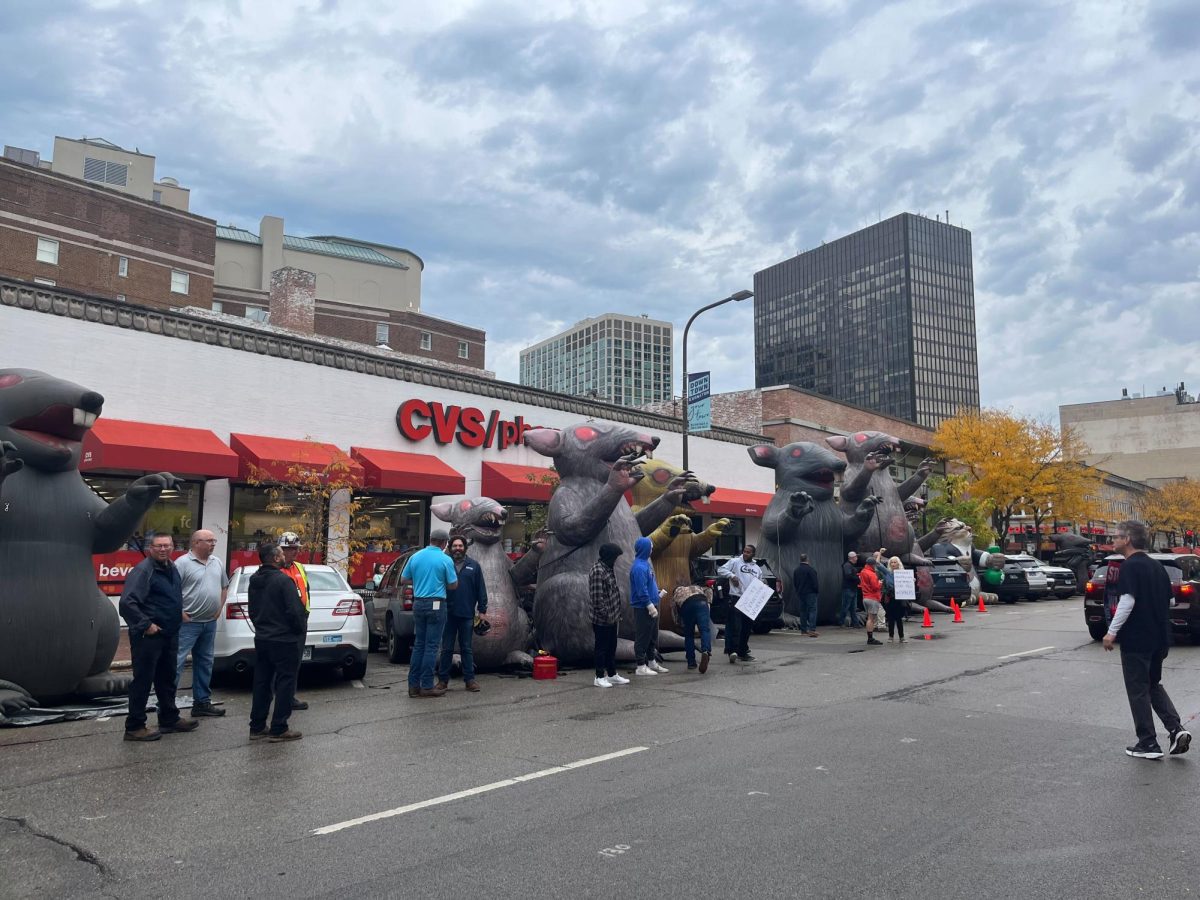About 25 local labor organizers — and a fleet of giant inflatable rats — lined Sherman Avenue early Thursday morning, calling for the city to pass a Responsible Bidder Ordinance.
Under current city law, publicly bid contracts for city construction projects go by default to the lowest bidder that is a “responsive and responsible” business. A Responsible Bidder Ordinance would specify that the city must award contracts to the lowest “responsible” bidder, encouraging officials to take into account contractors’ treatment of workers. The city doesn’t currently have a specific ordinance defining what qualifies as a “responsible” bidder.
As protesters pointed out Thursday, the lowest bidder isn’t always the “best.”
“A lot of times, we’ll have contractors that bid the lowest, and there are issues with their work performance or issues with their timelines or issues with their safety and having consistent manpower for projects,” Jeremy Esparza, a business agent with Laborers Local One who attended Thursday’s rally, said. “So RBO, in essence, is simply a taxpayer protection plan (to) make sure that taxpayer dollars are being spent wisely.”
Thursday’s rally drew members of local carpenter, ironworker, painter, electrician and bricklayer unions, many of whom came to emphasize the importance of prioritizing worker safety in choosing responsible bidders for city projects.
It was not the first time union members have called for safer conditions at job sites in downtown Evanston. Last month, several members of bricklayer and carpenter unions gathered outside of a construction site at 1710 Sherman Ave. to call for a fair contract at the site.
And as post-pandemic construction projects spring up throughout Evanston, city officials have continued to debate workers’ rights initiatives, including a potential minimum wage increase.
Robert Piane, a representative from the Carpenters Local 58 Union who attended last month’s picketing, said at Thursday’s rally union members have started discussing the need for an RBO with city councilmembers and hope to see it introduced at an upcoming meeting.
“It’s a process,” Piane said. “We’re trying to get more people from programs in the neighborhood to work in Evanston, that’s been an issue forever.”
Evanston currently has a Local Employment Program, which mandates that at least 15% of workers on job sites for city projects costing over $25,000 must live in the city. However, Piane said that during his 21 years working in the field as a carpenter, he always struggled to find Evanston residents on Evanston-based projects.
Esparza said a potential RBO could “further the ideals” of the LEP by encouraging the city to select contractors that are part of apprenticeship programs, which work to get Evanston residents on local job sites.
“Without us protecting market share, there will be no jobs for apprentices to go to,” John Gallagher, a representative of the Iron Workers Local 1 Union who attended Thursday’s rally, said. “So part of the RBO would be local participation on the job site giving (Evanston Township High School) students a pathway into the trades.”
Several local municipalities have passed RBOs, including Des Plaines, Forest Park and Oak Forest. Cook County also passed a county RBO in 2018.
As discussions with city officials continue, union members are hopeful that Evanston could soon join its neighbors in passing the ordinance.
“We want to make sure there’s a middle class in Evanston, especially around construction,” Esparza said. “This RBO can help ensure that.”
Email: lilycarey2025@u.northwestern.edu
Twitter: @lilylcarey
Related Stories:
—Union workers call for fair contract at Sherman Avenue construction site
—City Council approves execution of Participatory Budgeting projects, discusses minimum wage increase
—Rising office vacancies show warning signs for downtown Evanston



















